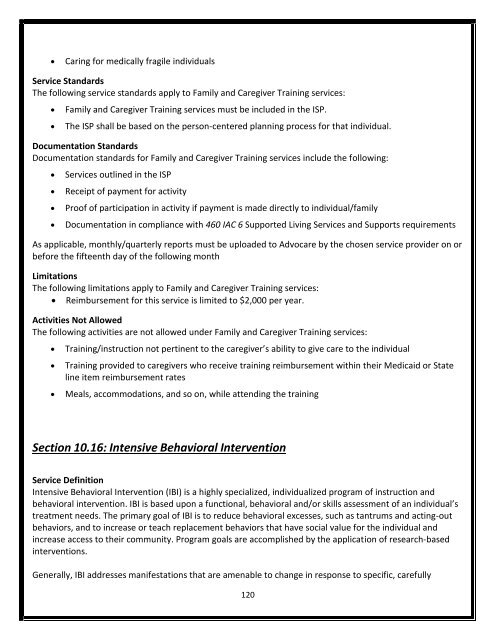DDRS Waiver Manual
2dXf5Pj
2dXf5Pj
You also want an ePaper? Increase the reach of your titles
YUMPU automatically turns print PDFs into web optimized ePapers that Google loves.
Caring for medically fragile individuals<br />
Service Standards<br />
The following service standards apply to Family and Caregiver Training services:<br />
<br />
<br />
Family and Caregiver Training services must be included in the ISP.<br />
The ISP shall be based on the person-centered planning process for that individual.<br />
Documentation Standards<br />
Documentation standards for Family and Caregiver Training services include the following:<br />
<br />
<br />
<br />
<br />
Services outlined in the ISP<br />
Receipt of payment for activity<br />
Proof of participation in activity if payment is made directly to individual/family<br />
Documentation in compliance with 460 IAC 6 Supported Living Services and Supports requirements<br />
As applicable, monthly/quarterly reports must be uploaded to Advocare by the chosen service provider on or<br />
before the fifteenth day of the following month<br />
Limitations<br />
The following limitations apply to Family and Caregiver Training services:<br />
Reimbursement for this service is limited to $2,000 per year.<br />
Activities Not Allowed<br />
The following activities are not allowed under Family and Caregiver Training services:<br />
<br />
<br />
<br />
Training/instruction not pertinent to the caregiver’s ability to give care to the individual<br />
Training provided to caregivers who receive training reimbursement within their Medicaid or State<br />
line item reimbursement rates<br />
Meals, accommodations, and so on, while attending the training<br />
Section 10.16: Intensive Behavioral Intervention<br />
Service Definition<br />
Intensive Behavioral Intervention (IBI) is a highly specialized, individualized program of instruction and<br />
behavioral intervention. IBI is based upon a functional, behavioral and/or skills assessment of an individual’s<br />
treatment needs. The primary goal of IBI is to reduce behavioral excesses, such as tantrums and acting-out<br />
behaviors, and to increase or teach replacement behaviors that have social value for the individual and<br />
increase access to their community. Program goals are accomplished by the application of research-based<br />
interventions.<br />
Generally, IBI addresses manifestations that are amenable to change in response to specific, carefully<br />
120


